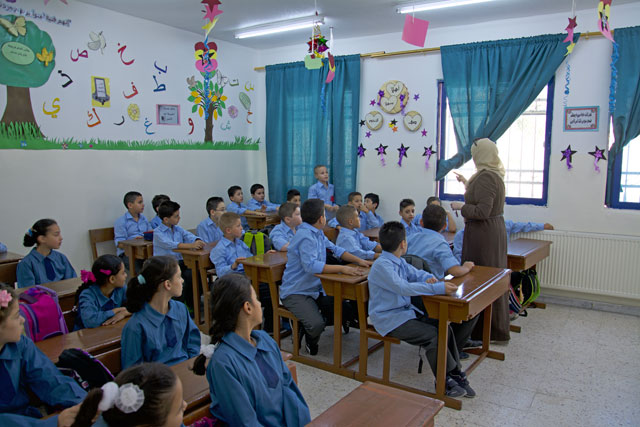AMMAN — A collective agreement regulating the working conditions of private schools teachers in Jordan was signed on Thursday between the General Trade Union of Private Education Employees (GUPWE) and the Private Schools Owners’ Association (PSOA).
The new collective contract, effective from the start of the 2017/18 academic year, was signed under the supervision of the Ministry of Labour, represented by its General Secretary Farouk Hadidi in his capacity as chairperson of the National Committee on Pay Equity (NCPE).
The agreement establishes a standard contract for teachers in the private sector, which will be mandatory unless an alternative contract offers better benefits.
The contract requires all salaries to be paid into bank accounts, unless agreed otherwise by the employees in a written statement.
The agreement also increases the minimum monthly wage to JD220, with a teaching allowance of JD10 per month, an annual raise of at least 5 per cent and an increase of JD5 per month for each year of employment in a school.
The contract obligates schools to provide day care centres in accordance with Article 72 of the Labour Law, while also making enrolment in social security compulsory for all workers.
In addition, a 45-day mutual probation period is stipulated, with no obligation imposed on employers or employees in case the teacher finds a better job, with guarantees that the teacher will be paid for all work done during this period.
The collective agreement applies to all private schools, regardless of their affiliation to the Union of Private Sector Schools or the membership of the workers to the General Union of Workers in Private Education.
The collective contract is the result of a long negotiation process promoted by the NCPE, which is chaired by the Ministry of Labour and the Jordanian National Commission for Women, with the support of the International Labour Organisation (ILO).
The ILO has provided extensive technical support to the national committee and supported the social dialogue platform that allowed all different actors, including the female teachers, to be involved in the negotiations.
Over the past years, the NCPE has brought to public attention the lack of decent work in the private education sector in Jordan, where many teachers, especially women, were not enjoying fair wages and decent working conditions.
This collective contract is the result of first-of-its-kind collective action from grassroots workers — especially women workers — in Jordan.
For some two years, organised teachers in Irbid have voiced their needs through the “Stand up with the teacher’s campaign” that has mobilised teachers in the country and conveyed their interests to the representatives of the GUPWE and the PSOA in a process of social dialogue.
It is predicted that the new collective agreement will impact around 37,000 private school teachers, the majority of them women.
It is a highly positive step in the right direction towards achieving women’s economic empowerment through collective action and representation. The NCPE will congratulate all actors involved in a ceremony, to take place in the coming weeks.
The ILO, jointly with the NCPE, will continue to work closely with social partners in the private schools sector to support the implementation of the agreement.
